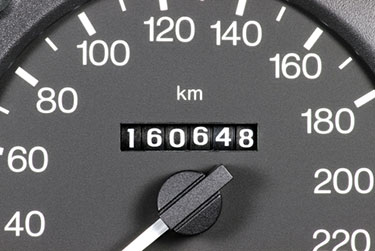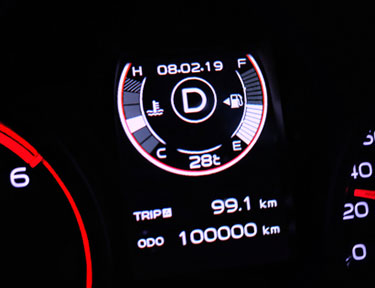
Written by Kayla Jane Barrie Updated on Dec 10, 2025 5 mins read

How much do you drive each year? The average car mileage in Canada can vary greatly based on where you live, your job, and many other factors. How much you drive can also affect your insurance, car maintenance costs, and how much you pay for fuel. Find out how you compare to other drivers. Here we provide you with information about the average vehicle mileage driven.
According to the NRCan Vehicle Survey, typical mileage per year is around 15,200 kilometres.
Approximately 11.5 million Canadians drive to work. Where you live and your lifestyle have an impact on the number of kilometres you drive in a year. Here is the typical annual mileage across all provinces:
As you can see, most drivers, regardless of province, drive a similar amount per year. Drivers in Newfoundland drive the most, and drivers in BC drive the least.
Cars last approximately 11 years on the road – this is the highest it’s ever been. A car’s life is not always determined by the number of kilometres driven. A car with 60,000 km on the odometer can be in worse shape than one with 120,000 km.
Modern technology has helped cars achieve a longer lifespan. When cars are properly maintained, they can last longer without requiring major repairs or replacement parts. A diligent repair schedule will keep your vehicle on the road for thousands of kilometres and many more years.
The distance you drive daily can impact the amount you pay for insurance. The more time you spend on the road, the higher your chances of being involved in an accident or filing a claim.
For example, one person drives an hour to the city every day, versus someone who drives 10 minutes to the train station. The driver with the longer commute times puts them at a higher risk.
If you have low mileage, you can be rewarded with lower insurance because you reduce the chance of exposing yourself to risks on the road. You can qualify for a insurance discount as a low-mileage driver. Low-mileage drivers can have savings between 3% to 10%.
When you get car insurance quote, one of the first questions you will be asked is “What is your annual mileage?
Some people only drive on the weekends, while others commute daily for work. There can be a huge difference in how much you drive annually. Here is how to calculate your annual mileage.

A typical vehicle is on the road for 11 years (up from 8 years in 1995). However, many drivers don’t realize the long-term financial benefits of keeping a car for 200,000 kilometres. Although there are repairs along the way, you can save around $30,000. This is the cost of a new car. The key to saving money is minimizing the impact of depreciation on your car.
Here are six tips on making your car last longer, even with high mileage.
With proper care, cars can last between 200,000 and 300,000 km. The make and model of your vehicle can also be a factor. Here are the top vehicles are known to last over 200,000 km.
Vehicles between 80,000 km and 100,000 are a good benchmark for buying used cars.
Estimate your yearly mileage. Figure out how many years you think you can get out of the vehicle based on its condition and mileage. Also, consider your monthly repair fees for the year to stay within your budget.
Learn more about mileage and its effect on driving with these common questions.
With proper care, cars can last between 200,000 and 300,000 km.
In Ontario, the typical mileage per year is around 16,000 kilometres.
The amount of time you spend driving can affect your Ontario car insurance. In the case of driving a low amount of kilometres, you can save money on your insurance. Since you are reducing exposure to risks on the road, you have options as a low-mileage driver.
If the car is a newer model with higher mileage, it may be worth it. Modern cars typically have up-to-date technology and fewer safety issues. It’s a good sign if a high-mileage car is still running smoothly despite how much it’s been on the road. If a car suits your lifestyle and you are committed to regular maintenance, buying a used car with higher mileage can be worth it.
Cars that have between 150,000 and 200,000 (and more) kilometres are considered high-mileage vehicles.
| Categories | Auto |
|---|---|
| Tags | Driving Tips |
Read our insurance blog to get helpful tips, information and news.
Fatal collisions in Canada rose 9.14% from 2019 to 2023. Discover the latest road safety statistics, provincial rankings, and how these trends affect your auto insurance rates.
Find out if a seatbelt ticket will raise your car insurance rates and how insurers view seatbelt violations.
Ontario’s Project CHICKADEE dismantled a $25 million auto theft ring. Discover how this massive bust targets export enablers and what it means for rising Canadian insurance premiums.
Think refusing a breath test helps your case? In Ontario, it results in a minimum fine of $2,000 and a criminal record. Compare the penalties and protect your future.